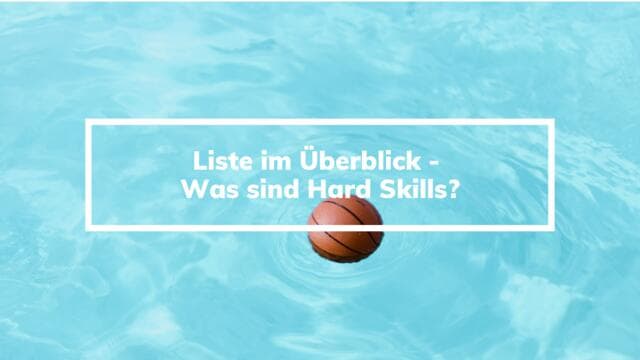What are hard skills?
We're always hearing about how important it is to include hard and soft skills on your CV, cover letter and job application. But what are hard skills exactly? Which hard skills are particularly important? And how do you learn hard skills?
23 June 2025 · 1 min read

We're always hearing about how important it is to include hard and soft skills on your CV, cover letter and job application. But what are hard skills exactly? Which hard skills are particularly important? And how do you learn hard skills?
We'll answer all these questions here. And if you want to know all about soft skills too, check out our article "What are soft skills?". Both skill types are important, so it's worth reading up on!
We've also written a list of the 10 most important soft skills at a glance.
But here, we're discussing the essentials of hard skills.
What does "hard skill" mean?
The term "hard skills" doesn't refer to the difficulty of the skills to learn – it's hard in the sense that contrasts with the "soft" in soft skills. Instead, "hard" means concrete: tangible and measurable. They are professional or technical skills that you can acquire. Whereas soft skills – or people skills – are less easily measured.
You learn these kinds of skills at school, such as reading, writing and arithmetic. School is the foundation level, where you learn the basic hard skills. This also includes learning foreign languages or completing a computer course, for example. These basic hard skills are expanded and complemented by vocational training, studying and/or practical experience. You're issued certificates and diplomas to evidence your knowledge of hard skills.
So, hard skills include basic professional skills learned at school, core competences from your studies or practical learning and additional qualifications such as training, additional courses or further development. You're constantly building on your job-relevant hard skills throughout your career.
Hard skills – some examples
Hard skills are all the professional competences you've acquired in the course of your life (school, studying, job). Hopefully, you'll have received a diploma or certificates that you can attach to your application as evidence of your hard skills.
The usual hard skills are:
School qualifications
Any qualification you gain at school: GCSEs, A-levels, baccalaureate or other educational certificate. This might be from a classical school or vocational school or college. Your final certificate shows your grades in various subjects (hard skills) and serves as a qualification for further study or training.
Higher education qualifications
These are degrees that you receive from universities, including a bachelor's, master's, postgraduate diploma or doctorate. These certificates attest to your subject-specific hard skills according to your degree programme. A degree proves you are qualified for certain professions, since you need to learn a lot of professional skills in order to earn one.
Apprenticeships and training
By completing an apprenticeship or professional training, you learn both practical hard skills and theoretical hard skills. These qualify you for certain jobs and form the foundation for the rest of your career.
Trainer certification
Trainer and assessor certification courses qualify you to train other people in your profession. For this, you will first need to have demonstrated sufficient skill in your area. This may involve formal higher level qualifications or recorded experience. There are various governmental and professional bodies that award higher professional qualifications and certifications, including trainer and assessor certification.
Foreign language skills
Foreign language skills are a hard skill set that are becoming increasingly important in many companies due to globalisation. Especially in international companies with locations abroad. You learn foreign languages at school, university, on language courses or by going abroad, e.g. in the form of a gap year.
Programming languages
Due to digitalisation, programming languages aren't only in demand among IT professionals. Mastering this hard skill is also a great advantage in other sectors. You learn programming languages at university or in courses. Examples of programming languages are PHP, Phyton, CSS, JavaScript and Vue.js.
Operating systems
There are several operating systems and not every company uses the same operating system. It's an advantage if you can operate both IOS and the Windows operating system, for example. This gives you an certain edge in terms of flexibility.
Computer programs
Just as there are different operating systems, there are many different software. The more computer skills you have, the better. These include, for example, the following programs: Microsoft Office, SPSS, Access, SAP, WordPress, Salesforce, Outlook, Adobe Premiere, Audacity and social media platforms.
Hard skills – why are they important?
Hard skills are just as important as soft skills. However, you need certain hard skills to be able to pursue certain professions, because the job skills involved, which are evidenced by certificates and credentials, are necessary in that area.
We explain the precise difference between hard skills and soft skills in our article "Soft skills vs. hard skills – what's the difference?". Check it out now!
Hard skills are so important for your application and especially for your career because they give you professional competences and therefore qualify you for a certain job. You could say that hard skills are the key that gets you in the door to your career. Without this key, you can't open the door and won't be able to impress your managers with your soft skills later down the line. Evidence of your hard skills is what proves you can do the concrete element of a job.
So, with this in mind, attend courses and learn new skills like foreign languages, programming languages or get certified in the MS Office or other valuable hard skills! Spice up your CV with these hard skills to make your profile stand out to recruiters when applying for jobs!
Did this article help you?
